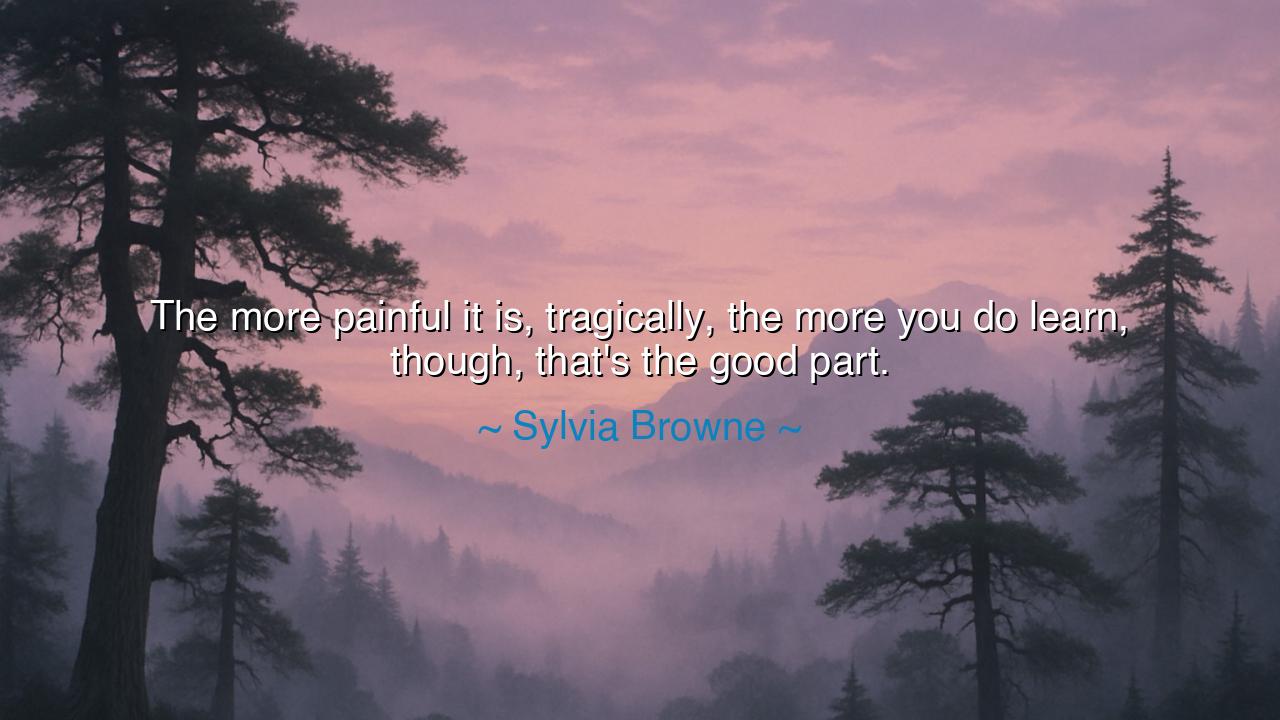
The more painful it is, tragically, the more you do learn
The more painful it is, tragically, the more you do learn, though, that's the good part.






“The more painful it is, tragically, the more you do learn, though, that’s the good part.” — Thus spoke Sylvia Browne, a seeker of the unseen and a voice attuned to the mysteries of human experience. In this phrase, she captures one of life’s oldest and most sacred truths: that pain is the great teacher, and through suffering, we come to understand the deepest dimensions of ourselves. Her words do not glorify pain, but rather illuminate its hidden gift — that within anguish lies awakening, and within loss lies learning. The heart, though it bleeds, grows wiser in the aftermath of its wounds.
To learn through pain is the most ancient of human lessons. Since the dawn of time, our ancestors understood that wisdom is not born from ease, but from endurance. Fire tempers steel; storms strengthen trees. So too, sorrow refines the soul. It strips away illusion, softens pride, and deepens compassion. When Sylvia Browne says that the “good part” lies in what pain teaches us, she reminds us that suffering is not meaningless. It is the forge in which character is shaped — the sacred crucible where understanding, patience, and humility are born.
History is filled with those who learned their greatest truths through pain. Consider Helen Keller, who was plunged into silence and darkness before her second birthday. Her world, once bright, became an abyss of isolation. Yet it was through that deep and tragic suffering that her spirit began its ascent. Guided by her teacher Anne Sullivan, she learned not only to communicate but to feel the pulse of life in ways others never could. Her pain became her teacher, her perseverance her salvation. From her struggle emerged a wisdom that still inspires generations — proof that the more painful it is, the more we learn.
Pain teaches in ways comfort cannot. It demands honesty. It strips away the masks we wear and reveals what is real. When life wounds us, it silences the noise of distraction and forces us to listen — to the quiet truth within. Those who have never known hardship may live lightly upon the surface of life, but those who have walked through sorrow move with depth and grace. Sylvia Browne’s words echo this sacred law: that suffering opens the door to wisdom, if only we have the courage to step through it rather than flee from it.
The ancients often spoke of this mystery. The Stoic philosophers taught that adversity is the anvil upon which virtue is forged. Marcus Aurelius, a ruler burdened with war and loss, wrote in his meditations that the obstacle is not the end of the path, but the path itself. The pain, he said, is the teacher of the soul. In every trial, one must ask not “Why me?” but “What can this teach me?” For pain without reflection is only suffering, but pain transformed through understanding becomes growth — the alchemy that turns grief into gold.
And yet, Browne calls this truth tragic. She acknowledges the sorrow in this paradox: that we learn the most not from joy, but from heartbreak; not from comfort, but from challenge. It is the tragedy of human life that enlightenment so often comes through loss. But this tragedy is also our triumph — for even when life takes everything, it cannot take our capacity to learn, to rise, to renew. The soul, once expanded by suffering, never shrinks again. Pain teaches resilience, and in resilience, we find our rebirth.
So, my child, when sorrow finds you — as it surely will — do not curse it too quickly. Sit with it. Listen to what it is trying to say. Ask what it is teaching you about patience, about empathy, about strength. Let your pain become your teacher, not your master. For every wound carries wisdom, and every tear waters the soil of growth. When the storm passes, you will not be the same — you will be more compassionate, more grounded, more human.
For this is the paradox Sylvia Browne reveals: that though pain is tragic, it is also sacred. It humbles the proud, awakens the sleeping, and refines the heart into gold. The wise do not seek pain, but when it comes, they do not run — they learn. And when they rise from its ashes, they rise not as they once were, but as those who have seen the depths of life and lived to tell its truths. That, indeed, is the good part — that from the deepest suffering blooms the brightest understanding, and from the broken heart grows the most enduring light.






AAdministratorAdministrator
Welcome, honored guests. Please leave a comment, we will respond soon